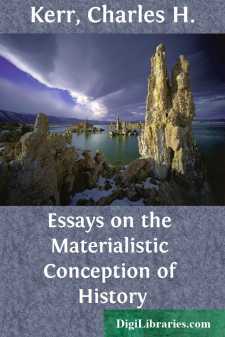Categories
- Antiques & Collectibles 13
- Architecture 36
- Art 48
- Bibles 22
- Biography & Autobiography 813
- Body, Mind & Spirit 142
- Business & Economics 28
- Children's Books 14
- Children's Fiction 11
- Computers 4
- Cooking 94
- Crafts & Hobbies 4
- Drama 346
- Education 46
- Family & Relationships 57
- Fiction 11829
- Games 19
- Gardening 17
- Health & Fitness 34
- History 1377
- House & Home 1
- Humor 147
- Juvenile Fiction 1873
- Juvenile Nonfiction 202
- Language Arts & Disciplines 88
- Law 16
- Literary Collections 686
- Literary Criticism 179
- Mathematics 13
- Medical 41
- Music 40
- Nature 179
- Non-Classifiable 1768
- Performing Arts 7
- Periodicals 1453
- Philosophy 64
- Photography 2
- Poetry 896
- Political Science 203
- Psychology 42
- Reference 154
- Religion 513
- Science 126
- Self-Help 84
- Social Science 81
- Sports & Recreation 34
- Study Aids 3
- Technology & Engineering 59
- Transportation 23
- Travel 463
- True Crime 29
Essays on the Materialistic Conception of History
by: Charles H. Kerr
Description:
Excerpt
PART I
IN MEMORY OF THE COMMUNIST MANIFESTO.
In three years we can celebrate our jubilee. The memorable date of the publication of the Communist Manifesto (February, 1848) marks our first unquestioned entrance into history. To that date are referred all our judgments and all our congratulations on the progress made by the proletariat in these last fifty years. That date marks the beginning of the new era. This is arising, or, rather, is separating itself from the present era, and is developing by a process peculiar to itself and thus in a way that is necessary and inevitable, whatever may be the vicissitudes and the successive phases which cannot yet be foreseen.
All those in our ranks who have a desire or an occasion to possess a better understanding of their own work should bring to mind the causes and the moving forces which determined the genesis of the Manifesto, the circumstances under which it appeared on the eve of the Revolution which burst forth from Paris to Vienna, from Palermo to Berlin. Only in this way will it be possible for us to find in the present social form the explanation of the tendency toward socialism, thus showing by its present necessity the inevitability of its triumph.
Is not that in fact the vital part of the Manifesto, its essence and its distinctive character?
We surely should be taking a false road if we regarded as the essential part the measures advised and proposed at the end of the second chapter for the contingency of a revolutionary success on the part of the proletariat,—or again the indications of political relationship to the other revolutionary parties of that epoch which are found in the fourth chapter. These indications and these measures, although they deserved to be taken into consideration at the moment and under the circumstances where they were formulated and suggested, and although they may be very important for forming a precise estimate of the political action of the German communists in the revolutionary period from 1848 to 1850, henceforth no longer form for us a mass of practical judgments for or against which we should take sides in each contingency. The political parties which since the International have established themselves in different countries, in the name of the proletariat, and taking it clearly for their base, have felt, and feel, in proportion as they are born and develop, the imperious necessity of adopting and conforming their programme and their action to circumstances always different and multiform. But not one of these parties feels the dictatorship of the proletariat so near that it experiences the need or desire or even the temptation to examine anew and pass judgment upon the measures proposed in the Manifesto. There are really no historic experiences but those that history makes itself. It is as impossible to foresee them as to plan them beforehand or make them to order. That is what happened at the moment of the Commune, which was and which still remains up to this day the only experience (although partial and confused because it was sudden and of short duration) of the action of the proletariat in gaining control of political power....


